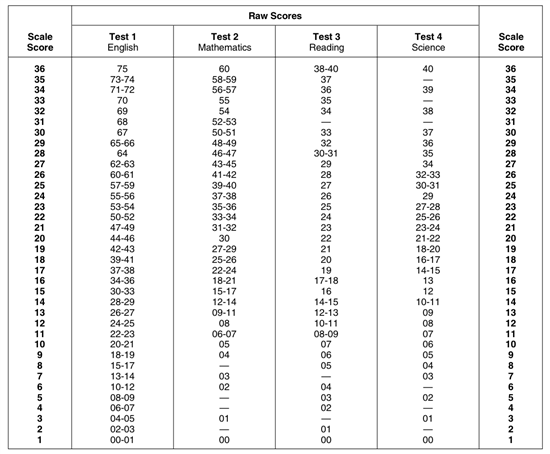As high school students across the United States prepare for college, many are faced with the challenge of standardized testing. One of the most widely used and recognized tests for college admissions is the ACT (American College Testing). But what exactly is a good ACT score? In this blog post, we will delve into the ACT, its scoring system, and what constitutes a good ACT score, as well as discuss the importance of the ACT in the college admissions process.
Understanding the ACT
The ACT is a standardized test designed to assess a student's academic readiness for college. It consists of four sections: English, Math, Reading, and Science, with an optional Writing section. The test measures a student's knowledge and skills in these areas, and the results are reported as scores in each section, as well as a composite score, which is the average of the four section scores. The ACT is scored on a scale of 1 to 36, with 36 being the highest possible score.
The ACT is administered by ACT, Inc., a nonprofit organization, and is typically taken by high school juniors and seniors. It is accepted by most colleges and universities in the United States as part of their admissions process, and many students take the ACT in addition to other standardized tests like the SAT (Scholastic Aptitude Test).
Scoring System of the ACT
To understand what constitutes a good ACT score, it's important to familiarize oneself with the scoring system of the ACT. Each of the four sections of the ACT is scored on a scale of 1 to 36, with 36 being the highest possible score. These scores are then averaged to calculate the composite score, which is also reported on a scale of 1 to 36.
In addition to the section and composite scores, the ACT also provides scores for each of the individual test questions, known as "raw scores". Raw scores are converted to scaled scores, which are then used to calculate the section and composite scores. The scaled scores take into account the difficulty level of the questions in each section and are designed to allow for meaningful comparisons of scores across different test forms and administrations.
It's also important to note that the ACT has an optional Writing section, which is scored separately on a scale of 2 to 12. The Writing score does not affect the composite score, but it is reported along with the other scores and may be considered by some colleges and universities as part of their admissions process.

What is Considered a Good ACT Score?
The question of what constitutes a good ACT score is subjective and can vary depending on various factors, such as the student's college aspirations, the competitiveness of the colleges or universities being considered, and the student's overall academic profile. However, there are some general guidelines that can help students and parents understand what is considered a good ACT score.
The national average ACT composite score is around 20.8, which means that a composite score above 20.8 can be considered above average. However, to be competitive for admission to most colleges and universities, students typically aim for a composite score that is higher than the national average.
A score of 24 or above is generally considered a good ACT score and can make a student competitive for admission to many colleges and universities. A score of 28 or above is considered a strong score, while a score of 30 or above is considered an excellent score. A score of 34 or above is considered an outstanding score and may make a student a top candidate for highly competitive colleges and universities.
It's important to note that these are general guidelines, and what is considered a good ACT score may vary depending on the specific college or university being considered. Some highly selective colleges and universities may have higher score requirements, while others may place more emphasis on other factors such as GPA, extracurricular activities, and essays. It's important for students to research the admission requirements and expectations of the colleges and universities they are interested in to get a better understanding of what is considered a good ACT score for those specific institutions.
Another factor to consider when evaluating ACT scores is the student's own academic strengths and weaknesses. For example, if a student excels in English and Reading but struggles with Math and Science, their overall composite score may be lower due to those weaker sections. In such cases, it's important to consider the individual section scores and how they align with the student's intended major or field of study. Some colleges and universities may place more emphasis on specific sections depending on the program or major the student is interested in. For instance, a student applying for an engineering program may be expected to have a higher Math score, while a student applying for a liberal arts program may have more emphasis on English and Reading scores.
It's also important to keep in mind that the ACT is just one piece of the college admissions puzzle. Admissions officers take a holistic approach to evaluating applicants, considering a variety of factors such as GPA, class rank, extracurricular activities, leadership experience, essays, recommendation letters, and more. While a good ACT score can certainly enhance a student's chances of admission, it's not the sole determining factor. It's essential for students to strive for a well-rounded application that highlights their strengths in multiple areas, rather than solely relying on their ACT score.
The Importance of the ACT in College Admissions
The ACT is an important tool that colleges and universities use to assess the academic readiness of applicants. It provides a standardized measure of a student's knowledge and skills in key areas such as English, Math, Reading, and Science, which are essential for success in college-level coursework. The ACT helps colleges and universities evaluate applicants from diverse educational backgrounds and provides a common benchmark for comparison.
In addition to assessing academic readiness, the ACT also serves as a factor in determining merit-based scholarships. Many colleges and universities offer scholarships based on a student's ACT score, among other criteria. A higher ACT score can increase the chances of receiving merit-based scholarships, which can significantly impact a student's ability to afford college tuition and other expenses.
Moreover, some states in the U.S. use the ACT as a mandatory or optional part of their high school assessment program. In such cases, the ACT scores can also have implications on a student's high school graduation requirements or overall academic progress. It's important for students to be aware of the policies and requirements of their respective states regarding the ACT and how it may impact their academic progress.
Preparing for the ACT
Achieving a good ACT score requires preparation and practice. Here are some tips for students to effectively prepare for the ACT:
- Familiarize Yourself with the Test Format: Understanding the format and structure of the ACT is crucial. Review the different sections of the test, the types of questions asked, and the time limits for each section. This will help you become familiar with the test and its requirements.
- Review Academic Content: The ACT assesses a student's knowledge and skills in English, Math, Reading, and Science. Review the academic content in these areas and identify any weak areas that may require additional practice. Utilize study materials, textbooks, online resources, and practice tests to reinforce your understanding of the academic content.
- Practice with Official ACT Tests: The ACT provides official practice tests that closely resemble the actual test. Take advantage of these practice tests to simulate the test-taking experience and gauge your readiness. Review your results and identify areas that need improvement.
- Time Management: Time is a critical factor in the ACT. Practice time management strategies, such as pacing yourself during the test, allocating time for each section, and managing your time within each section. This will help you complete the test within the allotted time frame and avoid leaving any questions unanswered due to running out of time.
- Take Practice Tests: Taking practice tests is one of the most effective ways to prepare for the ACT. It helps you get accustomed to the test format, timing, and types of questions asked. Practice tests also help you identify your strengths and weaknesses, allowing you to focus your efforts on areas that need improvement.
- Review and Learn from Mistakes: After taking practice tests, thoroughly review your answers, including the ones you got right. Understand the reasoning behind the correct answers and learn from your mistakes. This will help you identify any patterns or areas where you need to improve and adjust your preparation accordingly.
- Seek Help if Needed: If you're struggling with certain concepts or sections of the ACT, don't hesitate to seek help. You can ask your teachers, tutors, or peers for assistance. There are also numerous online resources, study guides, and prep courses available to help you with your preparation.
- Stay Calm and Confident: Test day can be stressful, but it's important to stay calm and confident. Make sure to get a good night's sleep before the test, eat a healthy breakfast, and arrive at the test center with all the necessary materials. Remember that you have prepared for this moment and you are capable of doing your best.
Interpreting ACT Scores
Once you receive your ACT scores, it's essential to understand how to interpret them. The ACT consists of four section scores (English, Math, Reading, and Science) and a composite score, which is an average of the four section scores. The composite score ranges from 1 to 36, with 36 being the highest possible score.
In addition to the composite score, you will also receive scores for each of the four sections, ranging from 1 to 36. These scores represent the number of correct answers out of the total number of questions in each section. The higher the score, the better you performed in that particular section.
It's important to note that the national average ACT score varies from year to year and typically falls in the range of 20-21. However, what is considered a good ACT score depends on the specific colleges or universities you are interested in. As mentioned earlier, different institutions may have different expectations and requirements when it comes to ACT scores.
To determine what is considered a good ACT score for a particular college or university, you can research their admissions data and find out the average ACT scores of admitted students. Many colleges and universities publish this information on their websites or provide it upon request. This will give you a benchmark to compare your ACT scores and determine if they fall within the competitive range for that institution.
In addition to the average ACT scores of admitted students, it's also important to consider the 25th and 75th percentiles of ACT scores. The 25th percentile represents the score below which 25% of admitted students fall, and the 75th percentile represents the score below which 75% of admitted students fall. If your ACT score falls above the 75th percentile, it is generally considered a strong score, while a score below the 25th percentile may be considered less competitive.
It's important to keep in mind that ACT scores are just one part of the overall admissions process, and many other factors are considered in the decision-making process, such as GPA, class rank, extracurricular activities, essays, recommendation letters, and more. Admissions officers evaluate applicants holistically, looking for well-rounded students who will contribute positively to their campus community.

Conclusion
In conclusion, a good ACT score is subjective and depends on various factors such as the requirements of the colleges or universities you are interested in, your academic goals, and your individual strengths and weaknesses. However, a good ACT score can generally be defined as one that meets or exceeds the average scores of admitted students at the colleges or universities you are interested in.
To achieve a good ACT score, it's important to engage in thorough preparation, including understanding the test format, content, and timing, practicing with official ACT materials and taking practice tests, reviewing and learning from mistakes, and seeking help if needed. Additionally, developing effective test-taking strategies, managing time well during the test, and staying calm and confident on test day can also contribute to achieving a good ACT score.
Remember that ACT scores are just one piece of the puzzle in the college admissions process. Admissions officers consider multiple factors when evaluating applicants, and a good ACT score alone may not guarantee admission. It's important to also focus on maintaining a strong GPA, engaging in extracurricular activities, writing compelling essays, obtaining strong recommendation letters, and showcasing your unique strengths and talents in your application.
Ultimately, the definition of a good ACT score may vary depending on your individual circumstances and goals. It's important to set realistic expectations for yourself, focus on your strengths, and strive to achieve your personal best. With diligent preparation, effective test-taking strategies, and a well-rounded application, you can increase your chances of success in the college admissions process. Remember that your ACT score is just one factor among many, and your potential for success in college and beyond goes beyond a single test score.
Frequently Asked Questions (FAQs) about ACT Scores:
What is a good ACT score?
A good ACT score can vary depending on the colleges or universities you are interested in, your academic goals, and your individual circumstances. Generally, a good ACT score is one that meets or exceeds the average scores of admitted students at the schools you are considering.
How are ACT scores calculated?
ACT scores are calculated based on the number of correct answers in each section, which are converted to a scaled score ranging from 1 to 36. The scores from each section (English, Math, Reading, and Science) are then averaged to obtain the composite score, which is the most commonly referenced score.
What factors can impact my ACT score?
Several factors can impact your ACT score, including your level of preparation, familiarity with the test format and content, time management skills during the test, and your individual strengths and weaknesses in the subject areas covered by the test.
Can I retake the ACT to improve my score?
Yes, you can retake the ACT to improve your score. Many students choose to retake the test to try and achieve a higher score, especially if they feel that their initial score does not accurately reflect their abilities. Colleges typically consider the highest composite score if you take the ACT multiple times.
Do all colleges and universities require ACT scores?
No, not all colleges and universities require ACT scores. Some schools may accept other standardized tests, such as the SAT, or may have test-optional policies where submitting ACT scores is not mandatory for admission. It's important to check the specific requirements of the schools you are interested in.
How much do ACT scores matter in the college admissions process?
ACT scores are just one piece of the puzzle in the college admissions process. Admissions officers consider multiple factors, such as GPA, extracurricular activities, essays, recommendation letters, and more. While a good ACT score can strengthen your application, it's important to remember that it's not the only determining factor for admission.






